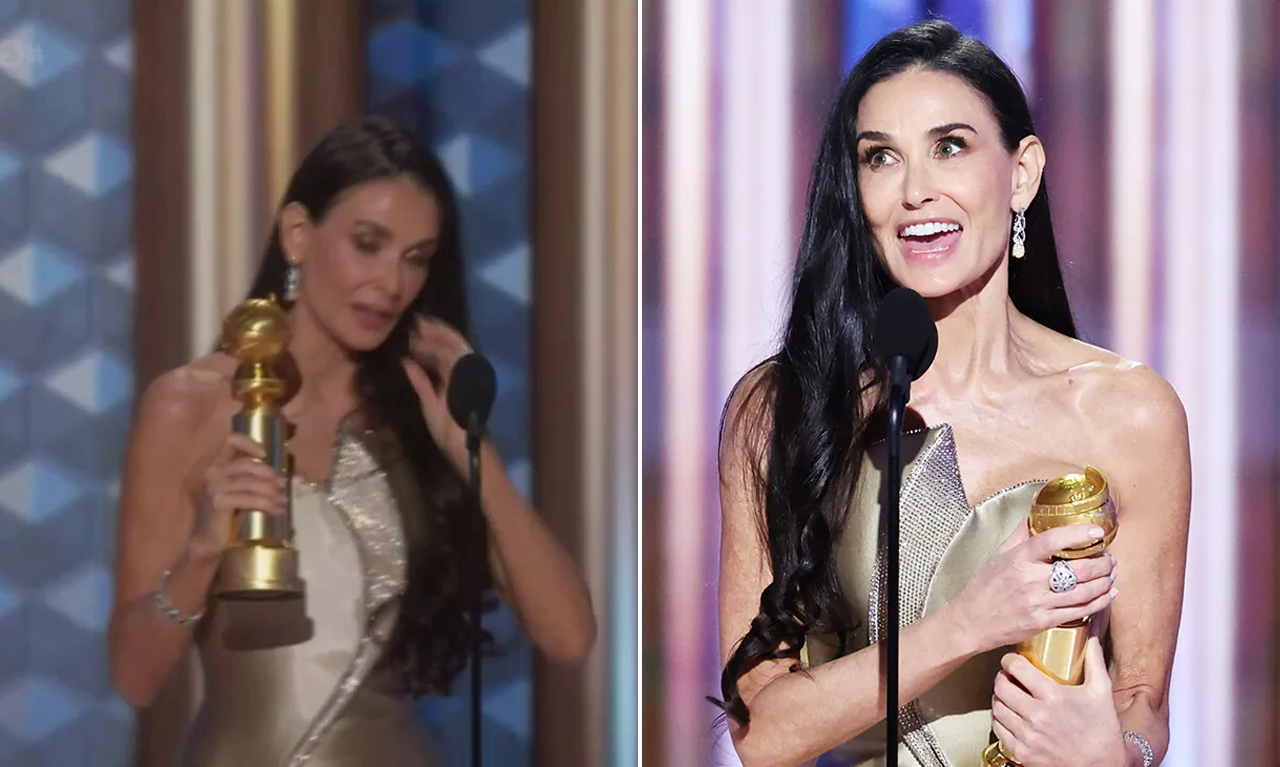The Netflix musical Emilia Pérez and the A24 drama The Brutalist were the most nominated films heading in to the 82nd Golden Globe Awards, so one shouldn’t be surprised that they each took home best picture prizes. But it’s still kind of unbelievable, when you pause and think about it, that the two biggest winners on Sunday night were, respectively, a Spanish-language, French-directed and American-distributed musical about a trans gangster, and a three-and-a-half-hour film shot in VistaVision and with an intermission.
Some will argue that these films embody everything that is “wrong” with Hollywood — that it is, allegedly, longwinded, preachy and out of touch with the “real” world — even though neither of them were really made in Hollywood and the Golden Globes are voted on by journalists based around the world who work for non-American media outlets. Others will insist that they are precisely the sort of audacious and humanistic works that should be made and celebrated.
Regardless of where one falls on that debate, the fact that they were embraced to the extent that they were at Sunday’s nationally-televised ceremony — The Brutalist also won best director (Brady Corbet) and drama actor (Adrien Brody), while Emilia also won best non-English-language film, best supporting actress (Zoe Saldaña) and best original song (“El Mal”) — is highly notable, considering that Oscar voters will begin filling out their nomination ballots on Wednesday.
That being said, the preferences of Globes and Oscar voters don’t always overlap — although last year, the first in which the Globes were chosen by a different set of voters than the old Hollywood Foreign Press Association, they essentially did — so none of the other campaigns should be folding up their tents just yet. In fact, quite a few representatives of other films took home individual Globes and gave acceptance speeches that will help their cause moving forward.
Case-in-point: Demi Moore, who won best musical/comedy actress for Mubi’s The Substance over Anora’s Mikey Madison, Emilia Pérez’s Karla Sofía Gascón and Cynthia Erivo for Universal’s Wicked, among others. Moore won — as I projected she would — for a truly tour-de-force performance. But she set herself up to keep winning by giving an emotional speech that reminded anyone watching just how long she’s been working, just how close she came to giving up as she got older and just how much this sort of recognition means to her now. As presenter Kerry Washington said after Moore left the stage, “Good luck to the next person who has to give a speech.”

Demi Moore Rich Polk/GG2025/Penske Media via Getty Images
As it turns out, the next person who had to give a speech also knocked it out of the park: Sebastian Stan, accepting best musical/comedy actor for A24’s A Different Man. The mixed-blessing for Stan is that he was so good in both of the films for which he was Globe-nominated this year — the other being Briarcliff/Rich Spirit’s drama The Apprentice, which he shouted out in his speech — that Oscar voters, who only have one best actor category, may split down the middle as far as which to back him for, which could keep him from getting nominated for either. I hope that’s not the case, as nobody has had a more impressive year than he has.
Also very good at the podium: Saldaña, whose speech was not unlike Moore’s, and even more effusive; Brody, who had himself and others in tears speaking about his parents, next to whom I happened to be sitting at the time; and Kieran Culkin, best supporting actor winner for Searchlight’s A Real Pain, who, like Saldaña in her category, really seems to be pulling away from the pack in his. Culkin’s self-deprecating awkwardness in his speeches this season remind me a lot of what we heard a year ago in the speeches of Robert Downey Jr., who all season long swept the same category in which Culkin is now competing. Talk about “character” actors!
Others will hopefully learn how to better capitalize on a moment in the spotlight moving forward. Corbet’s best director acceptance speech was read off an iPhone — never a good idea — but his best drama picture acceptance speech was given from the heart and was much more effective. Emilia Pérez helmer Jacques Audiard can’t be faulted for his shaky English, but he can be urged to give more focused speeches than those he gave accepting best musical/comedy picture and best non-English-language film. Fortunately for him on Sunday, he eventually turned over the mic to his leading lady, Gascón, during the former speech, and she rose to the occasion.

Kieran Culkin Rich Polk/GG2025/Penske Media via Getty Images
Other notable results?
Fernanda Torres, star of Sony Classics’ I’m Still Here, was an upset best drama actress winner over the likes of Angelina Jolie for Netflix’s Maria and Nicole Kidman for A24’s Babygirl. Torres has long been a favorite of Film Twitter, but it’s interesting to see evidence of actual votes for her excellent Portuguese-language performance.
Trent Reznor and Atticus Ross may be two-time Oscar winners, but their best original score win for for Amazon/MGM’s Challengers was nevertheless quite a surprise.
Sideshow/Janus’ Flow, the Latvian film that has been Oscar-shortlisted for best animated feature and best international feature, vanquished much higher-profile competition — including Dreamworks’ The Wild Robot, Disney/Pixar’s Inside Out 2, Netflix’s Wallace & Gromit: Vengeance Most Fowl and Disney’s Moana 2 — to win best animated feature.
And Wicked received the second annual Globe for best cinematic and box office achievement, which, a year after Barbie won it, appears to be becoming a place for voters to acknowledge a film that they probably won’t find much space to honor elsewhere, but the stars of which they’d like to get up to the podium.
But make no mistake about it: Wicked isn’t just — forgive me — popular. It’s also, like two of Sunday’s other underperformers, Focus’ Conclave (which won only best screenplay) and Anora (which went home emptyhanded), very good. And I think that those films could have a much stronger showing a week from tonight at the Critics Choice Awards.

Cynthia Erivo, Michelle Yeoh, Marc E. Platt, Ariana Grande, Jeff Goldblum and Jon M. Chu of ‘Wicked’ with presenter Vin Diesel. Rich Polk/GG2025/Penske Media via Getty Images






